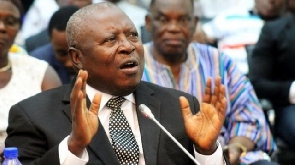A GNA Feature by Gideon Sackitey
Accra, June 14, GNA - In the last week of May, the picturesque lakeshore resort of Speke Resort Munyonyo in Kampala, Uganda hosted over 400 African Finance Ministers, Governors of the African Development Bank Group, officials of the World Bank and International Monetary Fund, Financial Experts, Rating Agencies and Financial Journalists across the world.
The occasion was the Annual Meetings of the African Development Bank Group, the Continent's premiere development finance institution, which for the second year running was held back-to-back with the Addis Ababa-based Economic Commission for Africa.
The subject? Trade. Indeed, free trade. The Meeting of the African Ministers of Finance, Planning and Development earlier in the week actually had "Strategies for Mainstreaming Trade for National Development.
The meeting went ahead to discuss why Africa with such tremendous wealth and people, still had one of the most unattractive brand names in world trade. The Continent is actually on record as having been the worst performer in terms of development over the last decade.
Africa actually backtracked with the entire 54 African economies recording a growth rate of just 3.7 per cent last year, the highest in four years according to the African Development Report and the African Economic Outlook launched during the Annual Meetings.
In fact, Africa is the only Continent not on course to meet the Millennium Development Goals (MDGs) by 2015.
In annual terms Africa's total merchandise revenue was made up of just one per cent of all the goods traded in the world. By implication every 100 dollars worth of goods that changed hands Africa, especially Sub-Saharan Africa earned only about a dollar.
This is a situation the experts call "a pittance" considering the Continent's vast natural resources when compared with the success of other less resourced regions and economies in other parts of the world.
AFRICA'S OVER-RELIANCE ON PRIMARY COMMODITIES
Yearly, Foreign Direct Investment (FDI) to Africa likewise is just one per cent of the trillions of dollars that is usually available to other regions for wealth creation.Regrettably too, the Africa Region on a continued basis is touted at many international fora as having the highest number of people living on less than a dollar a day, as if this tag is complimentary. Many are those who have come to terms that it is just a way of patronising Africans into believing something, which actually does not exist. Similarly, many are those who are torn between putting the blame squarely on African policymakers or the small prints that only make a mockery of the expression 'free trade'.
President Yoweri Museveni, a former rebel soldier, had come to terms with the realism of free trade and was most concerned.
He was optimistic about what good trading practices could do for Africa and was clear when he told the Meetings that Africa's dependence on primary commodities also means that Africa would remain vulnerable to market imperfections and severe unfavourable weather conditions that is fast becoming Africa's cup of tea.
President Museveni argued that rapid and sustained economic growth was key to poverty reduction in Africa.
"But this will only be possible if developed countries improve market for developing country exports by reducing trade distorting subsidies, which increase poverty.
"We must be given real chance to trade our way out of poverty," President Museveni said, adding, "the free flow of trade must be accompanied by a steady stream of technology transfer from developed countries."
The technology gap between the two worlds is astonishingly growing wider, a situation that denies developing countries the opportunity to participate fully in the global market economy.
Africa by all intents and purposes needs to create a domestic climate more conducive to private sector activity to be able to attract higher levels of Foreign Direct Investment (FDI).
While increased private sector, investment and productivity will accelerate growth and promote the attainment of the MDGs, many like the Ugandan Leader believe that the investment climate for both domestic and foreign investors still needed improvement in many countries on the Continent.
The onus in many respects has fallen on the Africa Development Bank Group to get more involved by ensuring that the investment climate improves in Africa.
"Africa needs the ADB to help it meet the challenges it (Bank) and governments face in reducing poverty. The areas they should be in, providing sound legal and regulatory framework for enterprises that promote higher competition, strengthening public and private governance and improving access to key utilities, financial and infrastructure services."
AFRICAN NEEDS NEGOTIATING EXPERTISE
Speaking to the Ghana news Agency in an interview, Mr Kingsley Y. Amoako, ECA Executive Secretary, said the situation was not lost on African leaders when viewed against the background that their preoccupation over the past year had been the issue of how to fashion out a trade policy and boost negotiation capacities of their experts. He had earlier told "Procurement News" that emerging evidence suggested that although Africa had liberalized extensively, this openness had not translated into growth."We have, therefore, argued that Africa should learn not from Asia and not to liberalize blindly. But should adopt dynamic trade policies that go beyond protection and revenue maximization that are driven by strategic development objective."
It is absolutely clear that Sub-Saharan Africa is sadly caught up in one of the most deplorable relationships with her trading partners where she has to continue exporting raw materials for the developed world to add value. Africa then goes on to import these goods at ridiculously high prices for her people.
The recent case of what the African Growth and Opportunity Act (AGOA) by the US Congress is neither right nor wrong as it just seems to be a dressing that takes the Continent no where.
Where African countries try to add value through processing, the harder it is to enter the lucrative European and American markets. Do not talk of trading between African states because it just does not happen.
Like Mr Yaw Osafo-Maafo, Ghanaian Minister of Finance and Economic Planning and his Ugandan counterpart Gerald Ssendaula said Africa must marshal all its efforts to negotiate better terms of trade with all its trading partners, and to achieve this, there was the need for concerted negotiations its trading partners in the developed world.
AFRICA NEEDS ONE VOICE
African Leaders must begin to see the need to generate concerted negotiations on the constraints to trade policy that the World Trade Organisation entails.A collective voice on trade, economic and other major social issues no doubt would send the strongest signal yet to the developed world as well as other private sector investors about Africa's determination to liberal trade policies.
It is in this direction that Omar Kabbaj, ADB Bank Group's call for African countries to take the lead in drawing up and implementing their own reform programmes is most welcomed.
He said enhanced support is critical for Africa's success if it is to work in partnership with the objectives of the New Partnership of African Development (NEPAD Initiative in 2001.
"Concerted action by the international donor community, including arrears clearance schemes, will, therefore, be required to help these countries rehabilitate their economies and create conditions for economic growth," he said.
This year, Africa is estimated to grow by 4.3 per cent, following the anticipated recovery of the global economy, higher primary commodity prices and moderate oil costs.
The issue of trade is at the heart of the debate on Africa's debt, the Highly Indebted Poor Countries (HIPC) Initiative and the sustainability of debt in the Continent's quest for accelerated growth and poverty reduction.
The future of Africa would be determined virtually by its trade performance as stated by the Report that Africa's share in the world's exports declined to three per cent in 2003, compared to six per cent in 1980.
Africa must reverse the poor situation in international trade and pursue, a strategy of export-oriented industrialisation among other things if things must change.
This process has to begin with the rationalisation of the agrarian style and create those linkages with the urban industrial sector that would generate new synergies in terms of export diversification. The role of a vibrant private sector in African economies needs to evolve within effective institutions for sound public management and development. 14 June 04














